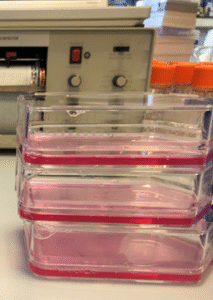
Researchers at the University of Kent are collaborating with Mr Jeffrey Lordan, Consultant and General Surgeon at Maidstone and Tunbridge Wells NHS Trust, to develop innovative diagnostic tools aimed at improving early detection of metastatic colorectal cancer (CRC).
Mr Lordan emphasises the transformative potential of improved diagnostics:
“Effective diagnostic tools can significantly enhance patient outcomes through timely and tailored treatment, while also reducing the financial burden on the NHS and improving quality of life for countless individuals. My particular interest lies in addressing the critical need for early detection of metastatic colorectal cancer.”
Despite the urgent clinical demand, Mr Lordan highlights a persistent gap in translational support for turning clinical needs and research insights into viable diagnostic tools. As a result, many patients currently undergo invasive, often unnecessary procedures, or remain undiagnosed until the disease has progressed, dramatically impacting treatment success and survival rates.

Presently, CRC diagnosis relies heavily on symptomatic presentation, patient self-examination, and a combination of colonoscopy, CT scans, and blood tests for carcinoembryonic antigen (CEA). However, these methods have limitations: only 1–3% of referrals result in a positive CRC diagnosis. This low yield places significant strain on healthcare resources, delaying identification of actual cases and risking disease progression.
Colonoscopy, the gold standard diagnostic, is not without risk. Complications such as bowel perforation occur in approximately 1 in 1,200 cases, and significant bleeding in around 1 in 600. With an estimated 750,000 to 1.5 million procedures performed annually in the UK, the cumulative cost of complications runs into the millions, further burdening the NHS.
To address these challenges, the Kent research team, in partnership with Mr Lordan, is currently validating a panel of novel biomarkers associated with solid colorectal cancer at both the mRNA (transcript) and protein levels. This foundational work will support the development of rapid, non-invasive diagnostic assays designed to detect CRC earlier, more reliably, and at lower cost.
This research represents a crucial step toward enhancing early diagnostic capabilities—offering the promise of faster interventions, improved monitoring, and ultimately, better patient outcomes in colorectal cancer care.